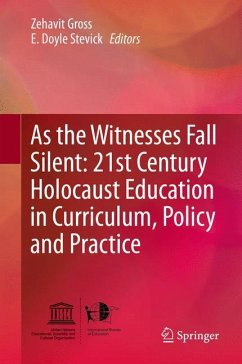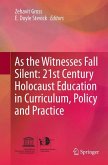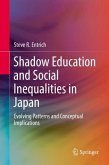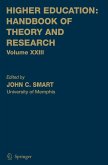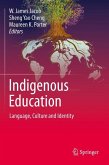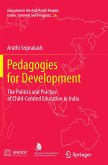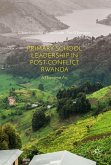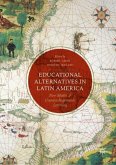As the Witnesses Fall Silent: 21st Century Holocaust Education in Curriculum, Policy and Practice
Herausgegeben:Gross, Zehavit; Stevick, E. Doyle
As the Witnesses Fall Silent: 21st Century Holocaust Education in Curriculum, Policy and Practice
Herausgegeben:Gross, Zehavit; Stevick, E. Doyle
- Gebundenes Buch
- Merkliste
- Auf die Merkliste
- Bewerten Bewerten
- Teilen
- Produkt teilen
- Produkterinnerung
- Produkterinnerung
This volume represents the most comprehensive collection ever produced of empirical research on Holocaust education around the world. It comes at a critical time, as the world observes the 70th anniversary of the liberation of Auschwitz.
We are now at a turning point, as the generations that witnessed and survived the Shoah are slowly passing on. Governments are charged with ensuring that this defining event of the 20th century takes its rightful place in the schooling and the historical consciousness of their peoples.
The policies and practices of Holocaust education around the world…mehr
Andere Kunden interessierten sich auch für
![As the Witnesses Fall Silent: 21st Century Holocaust Education in Curriculum, Policy and Practice As the Witnesses Fall Silent: 21st Century Holocaust Education in Curriculum, Policy and Practice]() As the Witnesses Fall Silent: 21st Century Holocaust Education in Curriculum, Policy and Practice103,99 €
As the Witnesses Fall Silent: 21st Century Holocaust Education in Curriculum, Policy and Practice103,99 €![Shadow Education and Social Inequalities in Japan Shadow Education and Social Inequalities in Japan]() Steve R. EntrichShadow Education and Social Inequalities in Japan97,99 €
Steve R. EntrichShadow Education and Social Inequalities in Japan97,99 €![Higher Education: Handbook of Theory and Research Higher Education: Handbook of Theory and Research]() John C. Smart (ed.)Higher Education: Handbook of Theory and Research179,99 €
John C. Smart (ed.)Higher Education: Handbook of Theory and Research179,99 €![Indigenous Education Indigenous Education]() Indigenous Education95,99 €
Indigenous Education95,99 €![Pedagogies for Development Pedagogies for Development]() Arathi SriprakashPedagogies for Development95,99 €
Arathi SriprakashPedagogies for Development95,99 €![Primary School Leadership in Post-Conflict Rwanda Primary School Leadership in Post-Conflict Rwanda]() Gilbert KararebaPrimary School Leadership in Post-Conflict Rwanda66,99 €
Gilbert KararebaPrimary School Leadership in Post-Conflict Rwanda66,99 €![Educational Alternatives in Latin America Educational Alternatives in Latin America]() Educational Alternatives in Latin America74,99 €
Educational Alternatives in Latin America74,99 €-
-
-
This volume represents the most comprehensive collection ever produced of empirical research on Holocaust education around the world. It comes at a critical time, as the world observes the 70th anniversary of the liberation of Auschwitz.
We are now at a turning point, as the generations that witnessed and survived the Shoah are slowly passing on. Governments are charged with ensuring that this defining event of the 20th century takes its rightful place in the schooling and the historical consciousness of their peoples.
The policies and practices of Holocaust education around the world are as diverse as the countries that grapple with its history and its meaning. Educators around the globe struggle to reconcile national histories and memories with the international realities of the Holocaust and its implications for the present. These efforts take place at a time when scholarship about the Holocaust itself has made great strides.
In this book, these issuesare framed by some of the leading voices in the field, including Elie Wiesel and Yehuda Bauer, and then explored by many distinguished scholars who represent a wide range of expertise.
Holocaust education is of such significance, so rich in meaning, so powerful in content, and so diverse in practice that the need for extensive, high-quality empirical research is critical. Th is book provides exactly that.
We are now at a turning point, as the generations that witnessed and survived the Shoah are slowly passing on. Governments are charged with ensuring that this defining event of the 20th century takes its rightful place in the schooling and the historical consciousness of their peoples.
The policies and practices of Holocaust education around the world are as diverse as the countries that grapple with its history and its meaning. Educators around the globe struggle to reconcile national histories and memories with the international realities of the Holocaust and its implications for the present. These efforts take place at a time when scholarship about the Holocaust itself has made great strides.
In this book, these issuesare framed by some of the leading voices in the field, including Elie Wiesel and Yehuda Bauer, and then explored by many distinguished scholars who represent a wide range of expertise.
Holocaust education is of such significance, so rich in meaning, so powerful in content, and so diverse in practice that the need for extensive, high-quality empirical research is critical. Th is book provides exactly that.
Produktdetails
- Produktdetails
- Verlag: Springer / Springer International Publishing / Springer, Berlin
- Artikelnr. des Verlages: 978-3-319-15418-3
- 2015
- Seitenzahl: 528
- Erscheinungstermin: 30. März 2015
- Englisch
- Abmessung: 241mm x 160mm x 34mm
- Gewicht: 915g
- ISBN-13: 9783319154183
- ISBN-10: 3319154184
- Artikelnr.: 42052585
- Verlag: Springer / Springer International Publishing / Springer, Berlin
- Artikelnr. des Verlages: 978-3-319-15418-3
- 2015
- Seitenzahl: 528
- Erscheinungstermin: 30. März 2015
- Englisch
- Abmessung: 241mm x 160mm x 34mm
- Gewicht: 915g
- ISBN-13: 9783319154183
- ISBN-10: 3319154184
- Artikelnr.: 42052585
This volume represents the most comprehensive collection ever produced of empirical research on Holocaust education around the world. It comes at a critical time, as the world observes the 70th anniversary of the liberation of Auschwitz. We are now at a turning point, as the generations that witnessed and survived the Shoah are slowly passing on. Governments are charged with ensuring that this defining event of the 20th century takes its rightful place in the schooling and the historical consciousness of their peoples. The policies and practices of Holocaust education around the world are as diverse as the countries that grapple with its history and its meaning. Educators around the globe struggle to reconcile national histories and memories with the international realities of the Holocaust and its implications for the present. These efforts take place at a time when scholarship about the Holocaust itself has made great strides. In this book, these issues are framed by some of the leading voices in the field, including Elie Wiesel and Yehuda Bauer, and then explored by many distinguished scholars who represent a wide range of expertise. Holocaust education is of such significance, so rich in meaning, so powerful in content, and so diverse in practice that the need for extensive, high-quality empirical research is critical. This book provides exactly that.
Preface: Mmantsetsa Marope, Director, UNESCO IBE.- Editors' notes and acknowledgements.- Part I: Introduction.- Holocaust education in the 21st century: Curriculum, policy and practice. E. Doyle Stevick and Zehavit Gross.- Part II: Framing the issues for a new millennium.- Address to the German Bundestag, 27 January 2000. Elie Wiesel.- "Why does the way of the wicked prosper?" Teaching the Holocaust in the land of Jim Crow: Ted Rosengarten.- Is teaching and learning about the Holocaust relevant for human rights education? Monique Eckmann.- Shoah, antisemitism, war and genocide: Text and context. Yehuda Bauer.- Learning from eyewitnesses: Examining the history and future of personal encounters with Holocaust survivors and resistance fighters. Dienke Hondius.- Teaching about and teaching through the Holocaust: Insights from (social) psychology. Barry van Driel.- Part III Reckoning with the Holocaust in Israel, Germany and Poland.- Between involuntary and voluntary memories: A case study of Holocaust education in Israel. Zehavit Gross.- Domesticating the difficult past: Polish students narrate the Second World War. Magdalena Gross.- Mind the gap: Holocaust education in Germany, between pedagogical intentions and classroom interactions. Wolfgang Meseth and Matthias Proske.- Part IV Holocaust education in diverse classrooms.- Holocaust education and critical citizenship in an American fifth grade: Expanding repertoires of meanings, language and action. Louise B. Jennings.- "They think it is funny to call us Nazis": Holocaust education and multicultural education in a diverse Germany. Debora Hinderliter Ortloff.- Genocide or Holocaust education: Exploring different Australian approaches for Muslim school children. Suzanne D. Rutland.- Part V: International dynamics, global trends and comparative research in Holocaust education. A global mapping of the Holocaust in textbooks and curricula. Peter Carrier, Eckhardt Fuchs, and TorbenMessinger.- International organisations in the globalisation of Holocaust education. Karel Fracapane.- Compliant policy and multiple meanings: Conflicting Holocaust discourses in Estonia. E. Doyle Stevick.- The Holocaust as history and human rights: A cross-national analysis of Holocaust education in social science textbooks, 1970-2008. Patricia Bromley and Susan Garnett Russell.- Measuring Holocaust knowledge and its relationship to attitudes towards diversity in Spain, Canada, Germany and the United States. Jack Jedwab.- Part VI Holocaust education in national and regional contexts.- Holocaust history, memory and citizenship education: The case of Latvia. Tom Misco.- Mastering the past? Nazism and the Holocaust in West German history textbooks of the 1960s. Brian Puaca.- Informed pedagogy on the Holocaust: A survey of educators trained by leading Holocaust organizations in the United States. Corey Harbaugh.- "Unless they have to": Power, politics and institutional hierarchy in Lithuanian Holocaust education. Christine Beresniova.- Holocaust education in Austria: A (hi)story of complexity and prospects for the future. Herbert Bastel, Christian Matzka, and Helene Miklas.- "Thanks to Scandinavia" and beyond: Nordic Holocaust education in the 21st century. Fred Dervin.- Holocaust education in Scotland: Taking the lead or falling behind? Paula Cowan and Henry Maitles.- Part VII To know, to remember, to act.- Failing to learn from the Holocaust. Geoffrey Short.- Towards a new theory of Holocaust remembrance in Germany: Education, preventing antisemitism and advancing human rights. Reinhold Boschki, Bettina Reichmann, and Wilhelm Schwendemann.- Epistemological aspects of Holocaust education: Between ideologies and interpretations. Zehavit Gross and Doyle Stevick.- Notes on contributors.
Preface: Mmantsetsa Marope, Director, UNESCO IBE.- Editors' notes and acknowledgements.- Part I: Introduction.- Holocaust education in the 21st century: Curriculum, policy and practice. E. Doyle Stevick and Zehavit Gross.- Part II: Framing the issues for a new millennium.- Address to the German Bundestag, 27 January 2000. Elie Wiesel.- "Why does the way of the wicked prosper?" Teaching the Holocaust in the land of Jim Crow: Ted Rosengarten.- Is teaching and learning about the Holocaust relevant for human rights education? Monique Eckmann.- Shoah, antisemitism, war and genocide: Text and context. Yehuda Bauer.- Learning from eyewitnesses: Examining the history and future of personal encounters with Holocaust survivors and resistance fighters. Dienke Hondius.- Teaching about and teaching through the Holocaust: Insights from (social) psychology. Barry van Driel.- Part III Reckoning with the Holocaust in Israel, Germany and Poland.- Between involuntary and voluntary memories: A case study of Holocaust education in Israel. Zehavit Gross.- Domesticating the difficult past: Polish students narrate the Second World War. Magdalena Gross.- Mind the gap: Holocaust education in Germany, between pedagogical intentions and classroom interactions. Wolfgang Meseth and Matthias Proske.- Part IV Holocaust education in diverse classrooms.- Holocaust education and critical citizenship in an American fifth grade: Expanding repertoires of meanings, language and action. Louise B. Jennings.- "They think it is funny to call us Nazis": Holocaust education and multicultural education in a diverse Germany. Debora Hinderliter Ortloff.- Genocide or Holocaust education: Exploring different Australian approaches for Muslim school children. Suzanne D. Rutland.- Part V: International dynamics, global trends and comparative research in Holocaust education. A global mapping of the Holocaust in textbooks and curricula. Peter Carrier, Eckhardt Fuchs, and TorbenMessinger.- International organisations in the globalisation of Holocaust education. Karel Fracapane.- Compliant policy and multiple meanings: Conflicting Holocaust discourses in Estonia. E. Doyle Stevick.- The Holocaust as history and human rights: A cross-national analysis of Holocaust education in social science textbooks, 1970-2008. Patricia Bromley and Susan Garnett Russell.- Measuring Holocaust knowledge and its relationship to attitudes towards diversity in Spain, Canada, Germany and the United States. Jack Jedwab.- Part VI Holocaust education in national and regional contexts.- Holocaust history, memory and citizenship education: The case of Latvia. Tom Misco.- Mastering the past? Nazism and the Holocaust in West German history textbooks of the 1960s. Brian Puaca.- Informed pedagogy on the Holocaust: A survey of educators trained by leading Holocaust organizations in the United States. Corey Harbaugh.- "Unless they have to": Power, politics and institutional hierarchy in Lithuanian Holocaust education. Christine Beresniova.- Holocaust education in Austria: A (hi)story of complexity and prospects for the future. Herbert Bastel, Christian Matzka, and Helene Miklas.- "Thanks to Scandinavia" and beyond: Nordic Holocaust education in the 21st century. Fred Dervin.- Holocaust education in Scotland: Taking the lead or falling behind? Paula Cowan and Henry Maitles.- Part VII To know, to remember, to act.- Failing to learn from the Holocaust. Geoffrey Short.- Towards a new theory of Holocaust remembrance in Germany: Education, preventing antisemitism and advancing human rights. Reinhold Boschki, Bettina Reichmann, and Wilhelm Schwendemann.- Epistemological aspects of Holocaust education: Between ideologies and interpretations. Zehavit Gross and Doyle Stevick.- Notes on contributors.

